Chris Baty's Blog, page 242
March 13, 2012
Adaptation
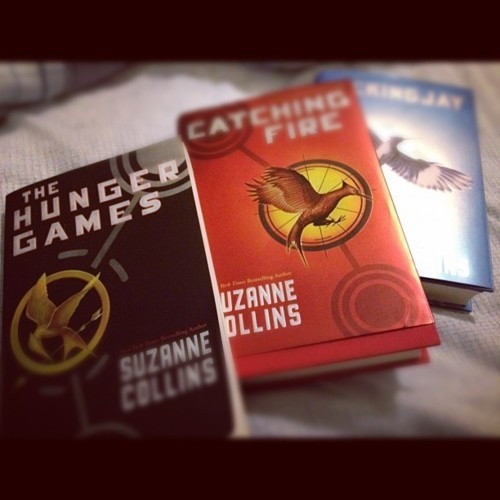
It's nearly mid-March which can only mean two things: One, it's almost time for Script Frenzy, and two, it's almost time for The Hunger Games premiere. I've been a proud, self-proclaimed Hunger Games nerd since I read the series a few months ago. If you haven't yet read it, I recommend it! It's a quick read and well worth it. To add to my delight, they are adapting the book into a full-blown movie, which seems to be a reoccurring pattern nowadays.
In fact, it seems that these days publishers are strategically seeking out novels that can be made into movies. Precious, The Kite Runner, The Lovely Bones, The Virgin Suicides—there must be hundreds, if not thousands of top box-office movies that started as books. So this leaves me wondering whether or not I should adapt a good book into my Script Frenzy script.[[MORE]]
If I did, what would I choose? Maybe I would choose the adorable novella The Little Prince, by Antoine de Saint-Exupéry. Or perhaps, The Brief Wondrous Life of Oscar Wao, by Junot Diaz. Although, thinking about it, it would be difficult to do justice to many of my favorite novels since they are just so well-written. What might be necessary is to think of the script and the novel as two separate entities, like J.K. Rowling said she did about her Harry Potter series in comparison to their cinematic counterparts.
That's how I'll be thinking of The Hunger Games movie as I watch it at the midnight premiere in a few weeks. Maybe one of you will see me there. I'll be the girl with my hair braided in the style of Katniss Everdeen's, handing out toasted Wonder Bread bearing the symbol of the Mockingjay to represent Peeta, "the boy with the bread".
So as the month marches forward (pun intended), I will continue to explore the idea of adapting a book into my Script Frenzy script. And now, out of curiosity I turn the question over to you: What book or story would you want to turn into a script?
- Aliza
March 12, 2012
Finding "My Person"

Last week in the office, I did something a little silly. I openly acknowledged my love for Grey's Anatomy to everyone. Now, I know what you may think. "Grey's Anatomy?! Didn't it jump the shark when Izzie started having hallucinations about her dead boyfriend/when Meredith and Derek actually got and stayed together/when they made a musical episode?"
And yes, it would seem that Grey's has joined the ranks of super-popular doctor dramas that start out amazing (if still a bit far-fetched) but ultimately get worse and worse with each season. And yes, I maybe wanted to stop watching all together when everyone began to belt out their frustrations a la High School Musical. But when I didn't, something pretty cool happened. The show became awesome again.[[MORE]]
I understand that there must be some people who think Grey's never lost its mojo, but I think we can all agree that this current season has gotten the show back to its roots with a good mix of borderline realistic story lines that I actually care about and interesting medical cases that ultimately attach me to both the core group of main characters and the transient guest stars.
Here, I'm thinking primarily of the Valentine's Day episode and the woman who stormed out of her and her boyfriend's apartment after she thought he was not going to propose to her, disappointing her as he'd done year after year. Since this is still Grey's Anatomy, he had of course planned on proposing to her via an ugly piece of jewelry, but got hit by a truck chasing after her and died. Surprise!
But who didn't feel totally devastated on that woman's behalf? Who didn't hate the unfairness of it all? In a mere 45 minutes, I was tied up in this couple's story, and could see them existing in reality. How did the writers work that out? In terms of script writing, I think that episode managed to accomplish something that seems impossible: getting the audience to care about a minor character that they know will not reappear. And this is something good television shows manage to do on a weekly basis.
Personally, as I face the task of molding my own major and minor characters into a script of my own, it makes me realize the importance of characterizing even those "littlest" of parts. Perhaps it's a matter of negotiating stock characteristics that many will understand, such as the spineless boyfriend and marriage-hungry girlfriend, with quirky and individual traits, or scenarios that make people stand out. At this point, I'm thinking that will be my strategy. Not reinventing the wheel, so to speak, but adding some hot spinning rims to preexisting wheels.
So now I turn it over to all of you. Any guilty-pleasure television shows that you plan on using for inspiration this April? Any strategies for making characters come alive not only on paper, but through an actor on stage or screen?
- Shelby
Photo by Flickr user skunks
March 9, 2012
Robert McKee: Sculpting the Shape of a Story

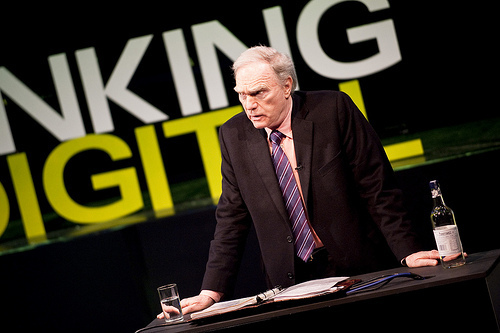
Robert McKee just might be the most intimidating screenwriting guru on the planet. You cerainly don't want to cross him when discussing character conflict or story arc—just view the famous scene in the film Adaptation where he dresses down Nicholas Cage with more than spit and vinegar.
His spitting aside, I love his take on the art of crafting a story. In print, he's actually friendly, inspiring, and helpful—a wise father figure.
That's why I often turn to his bible of screenwriting, Story: Substance, Structure, Style and The Principles of Screenwriting , whether I'm writing a script or a novel.
, whether I'm writing a script or a novel.
Here's a handful of reasons why I'll keep Story within arm's reach during Script Frenzy:
[[MORE]]
The book isn't about formulas, but about the underlying tenets of storytelling.
The "desire to touch an audience" guides each storytelling principle.
McKee is all about playing with a story to find a writer's unique storytelling voice.
"Stories are equipment for living," McKee likes to say, quoting the critic Kenneth Burke. Stories are close to sacred in other words—which is why he gets his hackles up sometimes.
McKee illustrates components of a script—structure, event, conflict, scene, act, climax, etc.—with eloquent lucidity and engaging erudition.
Also, his students have won 32 Academy Awards, and my lucky number is 33.
Do you have a favorite scriptwriting book? Please share. I can't get enough writing gurus in my life.
– Grant
Photo credit: Thinking Digital
March 8, 2012
NaNoWriMo 2011: The Participant Survey Results
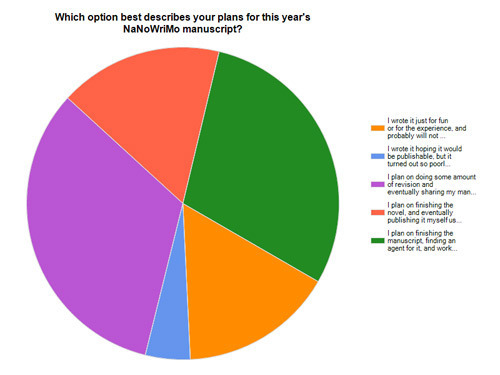
Over 10,000 NaNoWriMo participants filled out our 2011 survey, sharing the details of their experience with us and offering input on what worked well and what wasn't quite as attention-grabbing or successful.
Check out this quick-and-dirty breakdown of the results![[MORE]]
38% of you are between 18-29 years old. 30% are 13-17.
83% of you are female!
44% were first-time Wrimos in 2011.
68% live in the US.
84% are homed to a region.
Only 22% attended regional events.
Favorite site features include:
Word-count widgets
Forums
Profile pages
NaNoMail
Pep talks
The I Wrote a Novel, Now What? page
Winner Goodies
74% of you were "Very Satisfied" with your NaNoWriMo experience, with 20% feeling "Somewhat Satisfied."
67% donated monetarily, and 61% raised funds in other ways like using GoodSearch, getting sponsored through StayClassy, and buying merchandise!
81% donated or helped fundraise because they got something out of NaNo and wanted to give back. (48% were motivated by the fear that Chris Baty would come through the computer screen with his guilt monkeys.)
29% of survey respondents plan on finishing the manuscript, finding an agent for it, and working with the agent to sell the book to a publisher. 33% plan on doing some amount of revision and eventually sharing their manuscript with a small group of readers.
30% have plans to participate in at least one session of this summer's Camp NaNoWriMo. 43% are on the (split-rail) fence.
73% won NaNoWriMo 2011.
80% are definitely coming back for more in 2012! (And we can't wait to write alongside you then!)
We learned a lot from these results, and want to thank you all 10,143 of you again for sharing your feedback with us!
What surprised you about the results? What is the most important thing you think we should know that wasn't included here?
– Lindsey
March 7, 2012
Revision and Reading Aloud
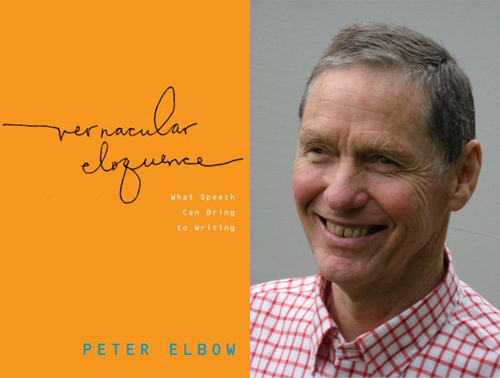
Today is World Read Aloud Day, and we hope you're able to make time to share the power of the written word with somebody. We think it's especially impactful to read the words that you've written. And If you're not yet ready to share them, we've got an idea: reading them aloud to yourself as a revision technique. Writing scholar Peter Elbow shares the effect of this approach in an excerpt from his new book, Vernacular Eloquence: What Speech Can Bring to Writing.
If people read aloud carefully each sentence they've written and then keep revising or fiddling with the words till they feel right in the mouth and sound right in the ear, the resulting sentence will be clear and strong. This is a bold claim. For skeptics I formulate it more rigorously: the resulting sentence will be much clearer and much stronger than if the writer relied only on an understanding of what sentences are supposed to look like—that is, relied only on knowledge of rules or principles.
Of course "clear and strong" is not the same as "correct." "Aint nobody don't use double negatives." This is a strong clear sentence—and true. And plenty of people hear no problem with "between her and I." So there's still a need for final copy editing for surface features like spelling and grammar and perhaps register—and this copy editing requires knowledge that the mouth and ear don't have. But the goal of revising by mouth and ear is not "correct grammar" but clarity and strength. The process is about meaning, not propriety. [[MORE]]
Mouth and ear. A major goal of my book is to harness the linguistic knowledge in the body or kinesthetic sense. Despite all the "incorrect grammar" that shows up in spontaneous unplanned speech, our mouths and ears have linguistic and rhetorical wisdom that good writing needs. It's a mistake to insist that all writing decisions come from conscious deliberation. Our mouths follow complex rules of grammar that our minds cannot tell us about. (Steven Pinker remarks that a child of four is following more complex and intricate rules of grammar than linguists have yet fully figured out.)
But many people need help and practice to learn the discipline of relying on tongue and ear for late revising. Many have been warned to distrust their mouths and ears and have a hard time overriding their sense of rules and principles. And of course people often don't understand the rules and principles they try to use—and in truth, the rules need to be taken with a grain of salt. But when I look into the process used by writers who seem to be naturally skilled, I usually discover that they have always instinctively tested everything they wrote against mouth and ear.
To give people practice, I start out with examples from published writing to how easy it is to improve the work of professionals. Here's one sample:
The newness of bilingual education means that the aim of research is more likely to be an account of what occurs when bilingual education is introduced than a demonstration of outcomes.
I start by getting people to read it aloud in pairs—without changes—for practice in reading aloud and to try to get a physical feel for meaning. Most of them hear pretty quickly that the sentence kind of bogs down and the meaning gets a little fogged over. Of course a good performance can make a bad sentence better—and I like to reward good readings; we all need practice in putting our bodies into written language. But even when we hear a really good reading that tries to give life to the sentence, I find most students can still feel a kind of mashed potatoes quality after "the aim of research." So then I ask them to continue in pairs and craft new versions—trying to use only the mouth and ear as tools. Here's a nice revision that came from this process:
Bilingual education is new. As a result, research on it is more likely to show what happens when it's introduced. Research on long term effects will be harder to get.
For another example, here is a "learning outcome" that a university adopted as a goal for all students:
Students enter, participate in, and exit a community in ways that do not reinforce systemic injustice.
I asked an undergraduate class to work on this with their tongues and mouths, and Dana Arvig came up with this lovely improvement:
Students participate in a community without reinforcing systemic injustice.
After I've done some training workshops with students, I can point to any tangled sentences and passages in the essay drafts they hand in and say "I'm having to struggle to read this. It feels clogged. Remember our workshops? Make it right for your mouth and ear. Make it speakable."
Of course style is subjective and mouths and ears differ—especially across cultural groups. In fact it's interesting to hear students argue about which versions of a sentence are better. When they argue on the basis of rules, guidelines, or grammar, the outcome is very unpredictable and sometimes scary: the sentence that most of them call right is often very sad. But when they argue on the basis of mouth and ear, I find the result encouraging—even when they vote against the version I prefer. It's usually strong and clear even if it's not the music I like—and most heartening of all—the conversation is very writerly. It helps them grow as stylists. Even the haughty brilliant H. W. Fowler (Modern English Usage) insists that people can improve their ear with practice (see the entry on "rhythm").
Reading aloud to revise is nothing new. It's been advocated since the early Greek rhetoricians. In the 18th century, Samuel Butler wrote that
I feel weak places at once when I read aloud where I thought, as long as I read to myself only, that the passage was all right.
But I haven't found satisfying analysis of why this simple traditional practice is so useful. Butler's words point to the most obvious benefit. Reading aloud intensifies our own experience of our own words through multiple channels of perception. We don't just see them with our eyes and understand them with our minds, we feel them with our mouths and hear them in our ears—and indeed experience them in our bodies. Flaubert made a soundproof room for testing his prose by reading it aloud and used a slang expression for putting his writing "a l'epreuve du gueuloir"—putting it to the test of his gullet or trap.
So when we read our words aloud, this helps us experience them as others will. Why do we so often glance in a mirror as we pass by? It's not just vanity—indeed it's seldom vanity at all. More often than not, we want a glimpse of how others see us. Reading aloud gives us that glimpse. When I speak aloud the words I've written, it's almost as though I've magically brought another person into the room. We increase our sense of audience.
Something subtle and interesting happens after we give ourselves lots of practice reading aloud to revise. The process increases our chance of noticing mismatches or friction between the outer physical experience of hearing the sound of our words and the inner mental or cognitive experience of feeling the meaning. After enough practice, we gradually begin to learn to notice when the fit is not so good between words and meaning—a sense of sounds flapping around a bit and slightly muffling the meaning. For example, I think many people would be able to hear some mismatch or static when they read these words aloud:
My own research shows that in a model simultaneously accounting for both House and Presidential on-year voting…
Our kinesthetic experience tells us that this passage will make readers work harder than they should. As we try out different wordings on our tongues and ears, we are looking for a better marriage between physical sound and mental meaning—as in this modestly improved version:
In my research, I used a model that accounts for both House and Presidential on-year voting.
When there's a better fit between sound and meaning, we come closer to the embodiment of meaning; we give readers a better chance of experiencing our meaning. (About the mysterious process of "feeling meaning," see Gendlin and Perl on "felt sense," and my "Felt Sense and the Wrong Word.")
Paradoxically the experience of sound in reading aloud helps even with the visual surface of writing: spelling, grammar, carelessly omitted or repeated words, and conventions of grammar and usage. Even though some of these matters are purely visual, like spelling, yet the mouth and ear help us catch what our eyes miss.
Reprinted from Vernacular Eloquence: What Speech Can Bring to Writing , by Peter Elbow, with permission from Oxford University Press, Inc. © 2012 Peter Elbow
March 2, 2012
Happy "Read Across America" Day!

If there's anything we at the Office of Letters and Light love as much as writing, it's reading. (And marmots.) So imagine our delight to learn that on this day, Dr. Seuss' birthday, Random House and the National Education Association (NEA) celebrate Seuss' legacy of exceptional children's books by encouraging people to pick up a book and read to a child.
What could be better?
Well, maybe encouraging people worldwide to pick up a book and read to a child. So that's what we are doing today here at OLL: encouraging our participants around the world to share the love of books and reading with the nearest and/or dearest kidlet.
We also invite you to share your fondest reading memory from childhood here.
I'll go first…
When I was a kid, I read to my dad instead of the other way around. I still have a photo documenting this nightly ritual, an inverse of the norm. I am reading animatedly from Matilda… and he is fast asleep under my pink striped duvet.
Your turn!
– Lindsey
Note: The amazingly awesome coffee mug pictured above belongs to Script Frenzy Program Director Sandra. I need that mug.
February 28, 2012
Scriptwriting: Head vs. Heart
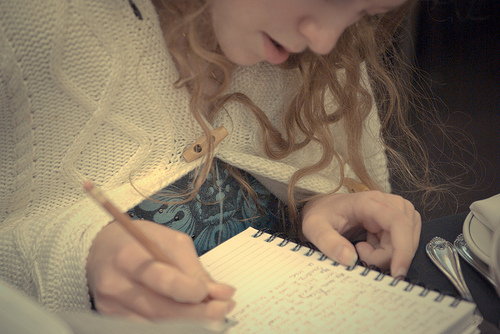
As April approaches, I find myself thinking more and more about my Script Frenzy script. But unfortunately, I don't yet have anything to show for it. I'm still struggling with choosing a topic. I have a number of stories that have been bouncing around my head for years but I feel that as a new scriptwriter I should try to avoid getting carried away or overwhelmed by sticking to a subject that I know. This is currently my biggest quandary: should I let my imagination run wild or write only what I know? Should I set out to write the next adventure/thriller or the next indie coming of age story?
On one hand "writing what you know" seems rather limiting and in a sense it is; it requires that you rein in your imagination and limit it to familiar terrain. But on the other hand, "writing what you know" calls for extreme creativity because it forces you to explore your own world with fresh eyes and a more scrutinizing perspective.
Only as I begin to really contemplate the task of capturing something that I know do I realize what a challenge that would be. If I decide to follow the age-old advice of writing "what I know," I'm going to have to ask myself some giant epistemological questions: "What is it that I know? Of what do I specifically have intimate knowledge? What have my experiences given me the authority to write about?" I think the different approaches to answering these questions is where the creativity comes in.
What would you suggest for a first-time scriptwriter? Do you start by writing what's in your head or what's in your heart? How much do you pull from your own experiences when writing?
– Jessie
Photo by Flickr user redcargurl
February 24, 2012
Archer's Story Begins Here…
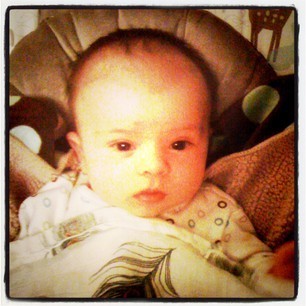
I'd like to introduce the newest member of the OLL family, Archer Grayson Stewart-Streit. This handsome little genius was born on December 21 (Winter Solstice!) at 6:07 AM, weighing in at seven pounds, six ounces. So far, his likes include eating, trees, Goodnight Moon, light fixtures, and balloons. His dislikes include being hungry, tummy aches, and much to his parents' dismay, getting dressed.
While most babies and toddlers have an aversion to clothing, most parents just love to dress their kids up in cute, hip little outfits that reflect their own interests and fashion leanings. This is very true for my husband and I, who both (both!) love spending our Sundays clothes shopping. And now we have someone else to shop for and dress each morning!
What we discovered, though, is that there is a serious lack of baby clothes that reflect my love of writing and literature. Love dogs? You got it. Love robots, monkeys, cowboys, rock and roll, outer space, and trucks? You got it! Love books? Too bad.
Then, on the day of Tupelo's launch party, we finally found this number:
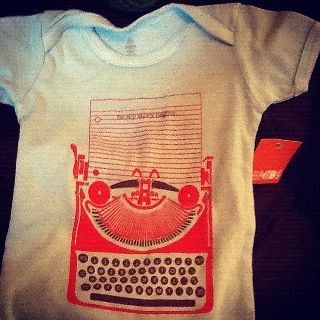
Awesome, right? This got me to thinking that there are all these writers out there who have or know babies, and next to no writerly baby clothes.
So, what if we did a NaNoWriMo onesie? What would you like it to depict? What about a slogan? Let us know, and we may add it to this fall's new line of NaNo swag. And if we pick your suggested concept, we'll send you a $50 gift certificate to the store!
February 23, 2012
Letters and Light Around the World: Tracy Dawson
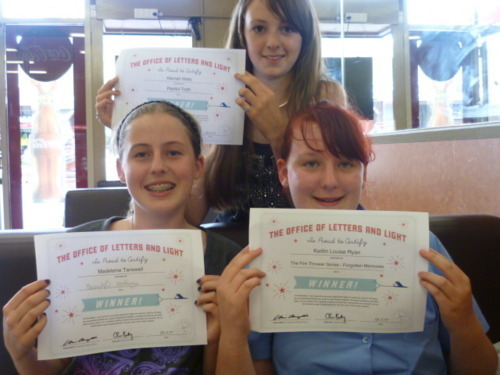
It's always fun to hear about kids and teens doing NaNoWriMo halfway around the world. Recently, we were sent an article about Tracy Dawson's work in the small town of Parkes, Australia (population: 9,826), and we had to learn more. Here, she tells us how she got a program going in a tiny community with no previous writing support.
How did you hear about the NaNoWriMo Young Writers Program, and what made you want to get involved?
Our school had several visits from Dr. Matthew Finch during 2011. He told me about NaNoWriMo and I was very interested and knew several students who were budding writers.
Coming from a rural town without a tradition of a writing community, how did you spark interest among your students?
I mainly publicised NaNoWriMo in school—using our newsletter, signage within the library, communication with English teachers, etc. I also posted on my library blog, Nailing Jelly to a Tree.
How did you and your students develop the plots for your novels? Where do you get ideas for your stories?
Most of my five students had ideas already. However, Matt had completed a couple of writing workshops in the library and I talked to the students about the writing methods of two Australian authors, Jackie French and Marcus Zusack, whom I had both seen present writing workshops at English Teacher Association conferences in previous years.
With regular school and exams, how did your students juggle their everyday lives with the writing process, and do they or you have tips for the rest of us?
I think they were just so keen they made themselves write a little each day, after studying first. Two of the students revised their word-count goals count downward and learned a valuable lesson about setting realistic expectations of themselves.
What does the future hold for your writing, and will you do NaNoWriMo YWP again?
In conjunction with Parkes Shire Library, we hope to begin writing workshops this year. They will involve adults and students and incorporate NaNoWriMo as an option for participants. Last year's authors are keen to go again and now there are many others who have expressed interest.
February 21, 2012
Would a Silent Movie Count?

As most of the staff here at OLL and Script Frenzy now know, I have no experience in scriptwriting. Like, really. None. But rather than feel intimidated, I'm trying to leap at the opportunity that will soon be presented to me this April. I even already have an idea. So what's the problem, you may ask? Rather than forming my initial thoughts about my script as such, I can't help but imagine it as a novel: heavy on description, omniscient narrator, light on character dialogue.
Which brings up the question: would a silent movie count? This prospect is becoming more and more appealing for me as I develop my idea. I'm hoping to write a murder mystery that takes place in the restaurant where I work. Imagine a busy Saturday night at a fancy steakhouse, and suddenly the waitstaff just start dropping like flies. But the surviving employees have to keep it secret from unsuspecting diners. Now imagine that as a silent film with creepy orchestra music. Scary, no? Or possibly some sort of dark comedy. We'll see how it goes.
And now, with just that initial question, my brain is flooded with other script questions. How will my script actually play out? What would it look like with real people playing the parts? What would the set look like? I guess this means my murder mystery novel will be on the back-burner til November.
How do you all of you start your scriptwriting process? Does it start with a novelistic storyline, or do you usually hear your actors playing their parts early in the process? And are any of my fellow script writing novices facing similar challenges?
– Shelby
Photo from the Orange County Archives
Chris Baty's Blog
- Chris Baty's profile
- 63 followers



